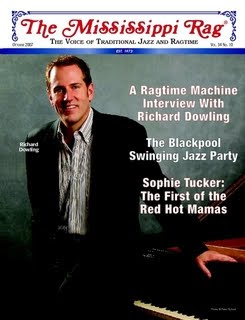A bit of old New Orleans is
featured every Friday evening at the Foundry in the Liberty Village Mall, Route
27, Walpole.
Exactly at 8:30, Stan McDonald raises his soprano saxophone
or clarinet to the playing position, he stamps his left foot to the snappy
tempo - counting out loud, "One, two, three, four" - and the Blue
Horizon Jazz Band hits the downbeat of its first tune of the evening.
Everyone plays a few bars together, and then the frontliners
begin taking solos - first, McDonald, followed by the trumpet and trombone,
each instrument providing counterpoint to the soloist's melodic line, while the
rhythm section, piano, banjo, bass and drums keeps a steady beat.
Jazz fans come from all over New
England to enjoy the traditional jazz and early swing and the
restaurant's fine cuisine.
The diners and the bar patrons have a good view of the band,
and there is an area for dancing. The acoustics in the high-ceilinged room are
excellent.
Bandleader McDonald, whose daytime job is Liberty Director
at Framingham State College, is considered to be one of the best reedmen in the
world. He is a disciple of Sidney Bechet, the famous soprano saxophonist and
the clarinetist from New Orleans.
 |
| Stan McDonald & George A. Borgman |
According to Alan C. Weber, who wrote the notes for the
band's 1982 record album, it is the "consensus that no living reedman
plays so effectively in the Bechet manner - full, rich, tone, pronounced
vibrato and long, lyrical melodic lines."
McDonald led the New Orleans Jazz Doctors from 1954 until
1960 and also performed with the New Orleans Six and the Historic Jazz Band.
In 1971, he was one of the founders of the New Black Eagles Jazz
Band. He travelled with that group to festivals throughout the United States and Europe.
He made numerous recordings with them. He left the Black Eagles and formed BHJB
in 1981.
Trumpeter Walter Miller, with a Harvard Ph.D. in anthropology
and a retired expert in street-gang sociology, is a trad jazz purist of the
Louis Armstrong school.
Miller played trumpet with Buck Clayton in Paris, Lil
Armstrong and Lee Collins in Chicago, and J. C. Higginbotham on the college
circuit. In Boston, he performed with bands at
such clubs as Storyville, Savoy, and Mahogany Hall, and he was also in
the Historic Jazz Band with McDonald.
Miller has been with the band since 1982, when McDonald
talked him into coming out of the musical retirement.
McDonald and Miller also do vocals. McDonald's vocal style is
reminiscent of Jack Teagarden's. He does well on "You're Such An Ugly
Child" and Jelly Roll Morton's "Don't You Leave Me Here." Miller
enjoys singing "After You're Gone" and "Sweet Lorraine." He
is particularly good on "Makin' Whoopee."
Retired engineer Ken Parsons, the trombonist, is a
self-taught musician. He sometimes played in McDonald's Jazz Doctors in the
1950s and also played with traditional and contemporary jazz groups in central Massachusetts before
joining BHJB a couple of years ago.
Pianist Phil Hower has a Ph.D. in electrical engineering and
is research director at an electronics firm.
Hower played with groups on the West Coast in the sixties,
and he had his own quartet in San
Francisco. He later played at bars in Pittsburgh
before moving to Boston,
where he developed a good reputation as an authentic trad jazz pianist. He
joined BHJB in 1983.
Royce Anderson, also a Ph.D., who teaches marketing at the Graduate School of Management, Clark University,
Worcester, came
on board with BHJB as a guitarist about a year ago. He formerly played the
blues, folk music and bluegrass on the guitar, but recently converted to a
six-string banjo.
"It's just like playing the guitar," Anderson explained.
"I sometimes bring a guitar to a gig, but the banjo has that nice,
percussive sound. There were some banjos with six strings back in the early
jazz days. Johnnie St.
Cyr played one in Louis Armstrong's Hot Five and Hot Seven."
Swiss-born Hans Brack, the youngest member of the group, is
taking a Ph.D. in chemistry at Brown
University. He played
bass with several bands in Boston
before joining BHJB in 1985.
Drummer Don Russell, a machinist, joined the group in April.
He said, "I don't like at all what is called jazz today, but I've always
loved this music. I like happy people, I like happy music and I like the New Orleans jazz."
BHJB played steady gigs at Ephraim's in Sudbury,
Bogart's Milford,
and the Sherborn Inn. It has had many one-nighters, including the Sticky Wicket
in Hopkinton, the Jazz Revival in Beverly and in
Cambridge at the Regatta Bar of the Charles Hotel.
The band was featured at the Manassas Jazz Festival in Virginia
in 1984, the Downeast Jazz Festival in Camden,
Maine, in 1988 and in 1990 at the
Pennsylvania Jazz Society's celebration of the 100th anniversary of jazz.
Through the years, BHJB has issued a cassette and two record
albums. A CD is currently in the works.
(George A. Borgman is a freelance writer.) - The Daily
Transcript, October 24, 1991.
Stan McDonald and his Blue Horizon Jazz Band is still
playing up a storm. George's widow and son Eric went to see them play at the
Sherborn Inn on November 20th! Apart from band members not much has changed
with McDonald and his music.
 The December 2007 issue of The Mississippi Rag was the very last one published. For its final year The Rag was published online.
The December 2007 issue of The Mississippi Rag was the very last one published. For its final year The Rag was published online.



























